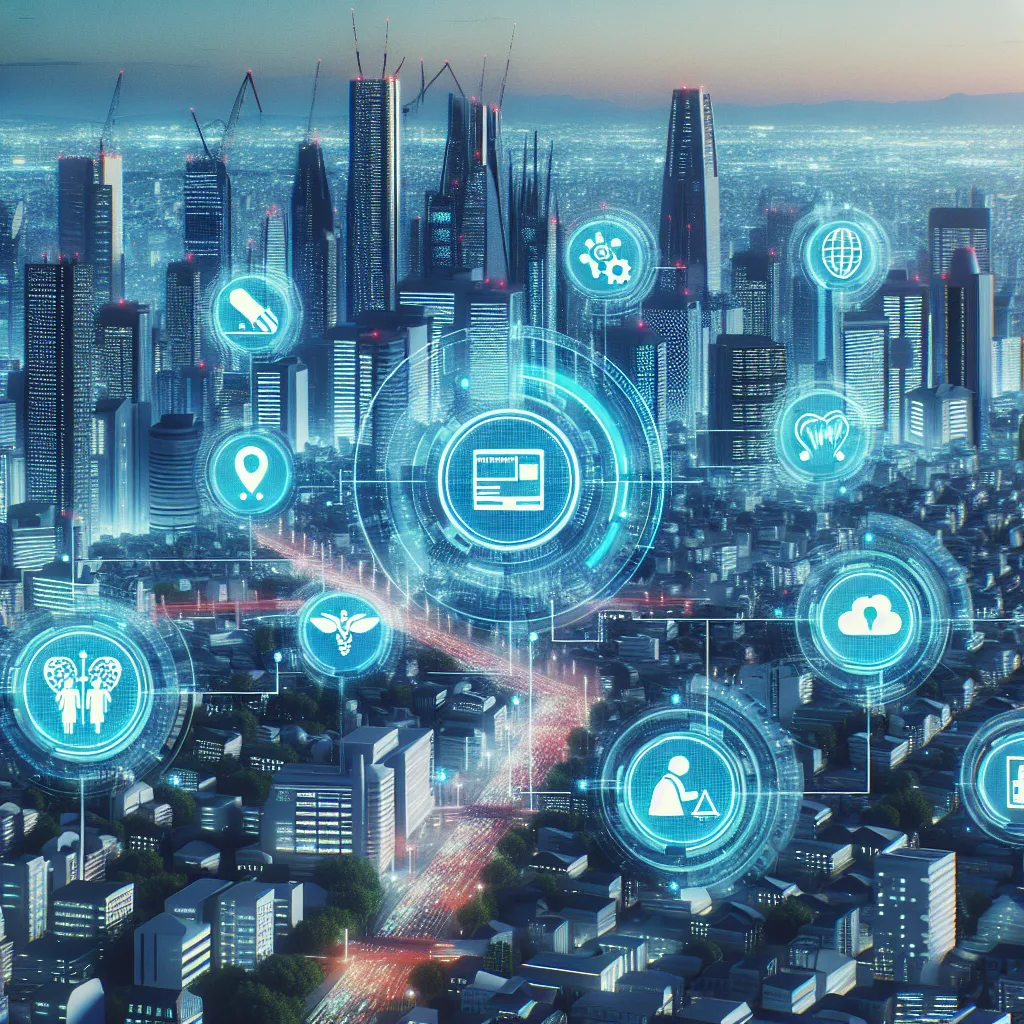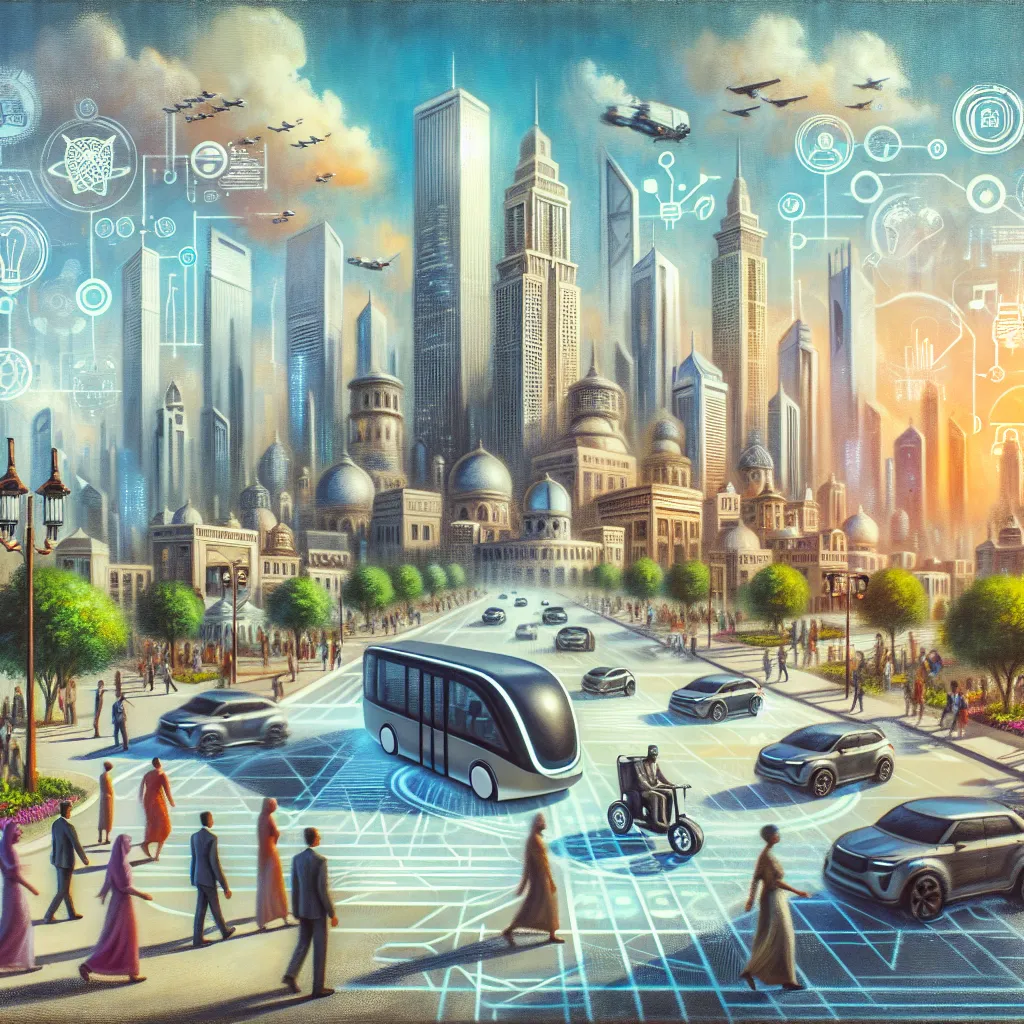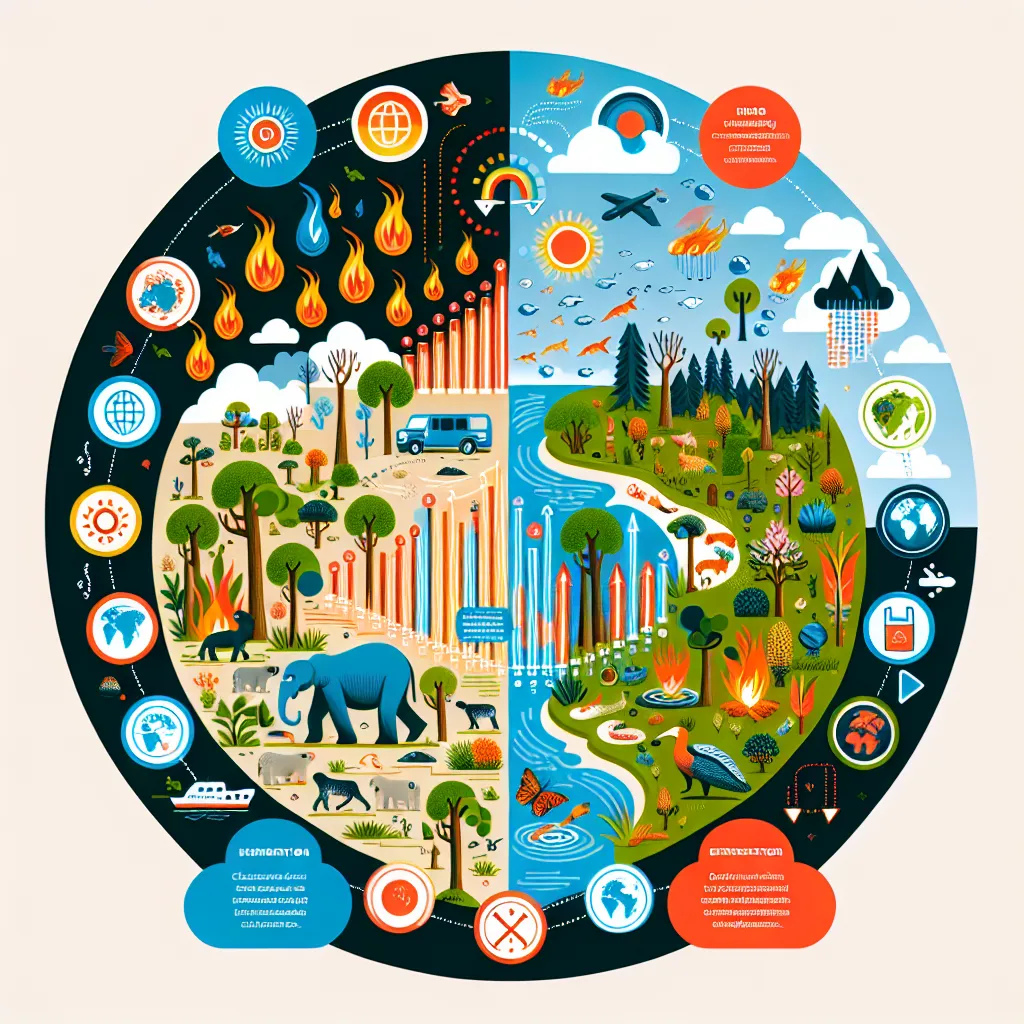In today’s IELTS Reading practice, we’ll explore the fascinating topic of “The role of artificial intelligence in improving public services”. This subject is not only relevant to current technological advancements but also addresses how AI is reshaping the way governments interact with citizens and deliver essential services. Let’s dive into our comprehensive IELTS Reading test, complete with passages, questions, and answers to help you prepare for the real exam.
Nội dung bài viết
- IELTS Reading Test
- Passage 1 – Easy Text
- The Rise of AI in Public Services
- Questions 1-5
- Questions 6-10
- Passage 2 – Medium Text
- AI’s Impact on Public Safety and Urban Management
- Questions 11-14
- Questions 15-20
- Passage 3 – Hard Text
- The Ethical Implications and Future Prospects of AI in Governance
- Questions 21-26
- Questions 27-33
- Questions 34-40
- Answer Key
- Passage 1
- Passage 2
- Passage 3
- Conclusion
 AI in Public Services
AI in Public Services
IELTS Reading Test
Passage 1 – Easy Text
The Rise of AI in Public Services
Artificial Intelligence (AI) is rapidly transforming the way governments operate and deliver services to their citizens. From streamlining administrative tasks to enhancing decision-making processes, AI is proving to be a powerful tool in the public sector. One of the most significant areas where AI is making an impact is in customer service and citizen engagement.
Many government agencies are now employing AI-powered chatbots and virtual assistants to handle routine inquiries and provide information to the public. These systems can operate 24/7, offering instant responses to common questions about services, regulations, and procedures. This not only improves the accessibility of information but also frees up human staff to focus on more complex issues that require personal attention.
Another area where AI is proving valuable is in data analysis and prediction. Government departments collect vast amounts of data on various aspects of society, from traffic patterns to health trends. AI algorithms can process this data much faster than humans, identifying patterns and trends that might otherwise go unnoticed. This capability is being used to predict and prevent issues before they become major problems, such as anticipating traffic congestion or forecasting disease outbreaks.
Moreover, AI is enhancing the efficiency of public services through process automation. Routine tasks that once required significant human effort, such as processing applications or sorting documents, can now be handled by AI systems with greater speed and accuracy. This not only reduces the workload on government employees but also minimizes errors and improves the overall quality of service delivery.
As governments continue to explore the potential of AI, it’s clear that this technology will play an increasingly important role in shaping the future of public services. While challenges remain, particularly in terms of privacy concerns and the need for human oversight, the benefits of AI in improving the efficiency, accessibility, and effectiveness of public services are becoming increasingly evident.
Questions 1-5
Do the following statements agree with the information given in the reading passage?
Write
TRUE if the statement agrees with the information
FALSE if the statement contradicts the information
NOT GIVEN if there is no information on this
- AI-powered chatbots can only operate during regular business hours.
- AI systems can process data faster than humans.
- The use of AI in public services has eliminated the need for human employees.
- AI is being used to predict and prevent issues in areas such as traffic and health.
- All government agencies have fully implemented AI systems in their operations.
Questions 6-10
Complete the sentences below.
Choose NO MORE THAN TWO WORDS from the passage for each answer.
- AI is transforming the way governments operate and deliver __ to citizens.
- AI-powered chatbots and virtual assistants handle __ and provide information to the public.
- Government departments collect __ on various aspects of society.
- AI algorithms can identify __ and trends in data that humans might miss.
- Process automation through AI reduces the __ on government employees.
Passage 2 – Medium Text
AI’s Impact on Public Safety and Urban Management
The integration of Artificial Intelligence (AI) into public safety and urban management systems represents a significant leap forward in how cities operate and protect their citizens. This technology is not just enhancing existing systems; it’s revolutionizing the very fabric of urban life and governance.
In the realm of public safety, AI-powered surveillance systems are becoming increasingly sophisticated. These systems can analyze video feeds in real-time, identifying potential security threats or criminal activities with a level of accuracy and speed that far surpasses human capabilities. For instance, facial recognition technology, combined with AI algorithms, can scan crowds to locate missing persons or identify known criminals. However, this application of AI has sparked intense debate about privacy rights and the potential for misuse.
Traffic management is another area where AI is making substantial inroads. Smart traffic light systems use AI to analyze traffic flow and adjust signal timing accordingly, reducing congestion and improving overall traffic efficiency. Moreover, AI models can predict traffic patterns based on historical data, weather conditions, and upcoming events, allowing city planners to proactively manage traffic flow during peak times or special events.
Urban planning and development are also benefiting from AI’s analytical prowess. By processing vast amounts of data from various sources – including satellite imagery, census data, and real-time sensors – AI can help city planners make more informed decisions about infrastructure development, zoning, and resource allocation. This data-driven approach enables cities to grow more sustainably and efficiently, addressing the needs of their populations more effectively.
Emergency response systems have been dramatically enhanced through AI integration. Predictive models can forecast the likelihood of emergencies in specific areas, allowing for more strategic placement of emergency services. During actual emergencies, AI systems can coordinate complex responses, prioritizing calls, dispatching resources, and even providing real-time guidance to first responders.
Environmental monitoring and management have also seen significant improvements with AI. Smart sensors deployed throughout cities can collect data on air quality, water pollution, and noise levels. AI algorithms analyze this data to identify trends, predict potential environmental issues, and suggest mitigation strategies. This proactive approach to environmental management is crucial for maintaining the health and well-being of urban populations.
While the benefits of AI in urban management and public safety are clear, challenges remain. Issues of data privacy, algorithmic bias, and the digital divide must be carefully addressed to ensure that the implementation of AI in public services is equitable and ethical. Additionally, there’s a need for ongoing training and education to ensure that public sector employees can effectively work alongside AI systems.
As cities continue to grow and face increasingly complex challenges, the role of AI in public services will undoubtedly expand. The key will be to harness this technology in ways that enhance the quality of life for all citizens while safeguarding individual rights and fostering inclusive communities.
Questions 11-14
Choose the correct letter, A, B, C, or D.
-
According to the passage, AI-powered surveillance systems:
A) Are not as accurate as human observers
B) Can only identify missing persons
C) Have sparked debate about privacy concerns
D) Are universally accepted as beneficial -
Smart traffic light systems use AI to:
A) Replace human traffic controllers
B) Analyze and adjust traffic flow
C) Predict weather conditions
D) Communicate with drivers -
In urban planning, AI helps by:
A) Replacing city planners
B) Building new infrastructure
C) Processing data from various sources
D) Conducting census surveys -
The passage suggests that the implementation of AI in public services:
A) Is without any challenges
B) Should be avoided due to privacy concerns
C) Requires careful consideration of ethical issues
D) Is only beneficial for large cities
Questions 15-20
Complete the summary below.
Choose NO MORE THAN TWO WORDS from the passage for each answer.
AI is revolutionizing public safety and urban management in several ways. In public safety, AI-powered systems can analyze video feeds to identify (15)__ or criminal activities. For traffic management, AI uses (16)__ to improve traffic efficiency. In urban planning, AI processes data from various sources to help make informed decisions about (17)__. Emergency response systems benefit from AI through (18)__ that can forecast the likelihood of emergencies. Environmental management uses smart sensors to collect data on various factors, and AI analyzes this data to identify trends and suggest (19)__. Despite these benefits, challenges such as data privacy and (20)__ need to be addressed for equitable implementation of AI in public services.
Passage 3 – Hard Text
The Ethical Implications and Future Prospects of AI in Governance
The integration of Artificial Intelligence (AI) into public services and governance structures represents a paradigm shift in how societies function and how governments interact with their citizens. While the potential benefits are immense, ranging from enhanced efficiency to more personalized services, this technological revolution also brings forth a host of ethical considerations and challenges that must be carefully navigated.
One of the primary concerns surrounding the use of AI in governance is the issue of algorithmic bias. AI systems are trained on vast datasets, which may inadvertently incorporate existing societal biases. For instance, if historical data used to train an AI system reflects past discriminatory practices in areas such as law enforcement or loan approvals, the AI might perpetuate these biases in its decision-making processes. This could lead to the systemic marginalization of certain groups, exacerbating existing inequalities rather than alleviating them.
Privacy concerns also loom large in the discourse surrounding AI in public services. The effectiveness of AI systems often relies on access to large amounts of personal data. While this data can be used to tailor services and improve efficiency, it also raises questions about data security, consent, and the potential for misuse. The concept of “surveillance capitalism”, where personal data becomes a commodity, takes on new dimensions when applied to government services. There is a delicate balance to be struck between leveraging data for public good and protecting individual privacy rights.
Another significant ethical consideration is the question of accountability and transparency in AI-driven decision-making processes. When AI systems make or influence decisions that affect citizens’ lives – from determining eligibility for social services to influencing sentencing in criminal cases – it becomes crucial to understand how these decisions are made. However, the complexity of many AI algorithms, particularly those involving deep learning, can make it challenging to explain their decision-making processes in terms that are easily understandable to the general public or even to policymakers. This “black box” nature of AI decision-making raises concerns about due process, accountability, and the right to appeal decisions.
The potential for AI to centralize power and control is another area of ethical concern. As governments become more reliant on AI systems for decision-making and service delivery, there is a risk of concentrating too much power in the hands of those who control these systems. This could potentially undermine democratic processes and lead to a technocratic form of governance where algorithms, rather than elected officials or public servants, make critical decisions affecting society.
Despite these challenges, the future prospects of AI in governance are promising, provided that ethical considerations are placed at the forefront of development and implementation. One potential positive outcome is the development of more responsive and personalized public services. AI could enable governments to tailor services to individual needs more effectively, potentially improving outcomes in areas such as healthcare, education, and social services.
AI also holds the promise of enhancing government transparency and reducing corruption. By automating processes and creating digital audit trails, AI systems could make it more difficult for individuals to manipulate systems for personal gain. Moreover, AI-powered analytics could help identify patterns of corruption or inefficiency that might be difficult for humans to detect.
Looking to the future, the concept of “algorithmic governance” is gaining traction. This approach envisions a system where AI not only assists in implementing policies but also plays a role in policy formulation itself. By analyzing vast amounts of data and simulating potential outcomes, AI could help policymakers make more informed decisions. However, this approach also raises questions about the role of human judgment and values in the policymaking process.
As we move forward, it is crucial to develop robust ethical frameworks and governance structures for AI in public services. This may involve the creation of independent oversight bodies, the development of AI auditing processes, and the establishment of clear guidelines for the use of AI in different domains of governance. Additionally, there is a need for ongoing public dialogue and education about AI to ensure that citizens understand how these systems are being used and can participate in shaping their development and implementation.
In conclusion, while the integration of AI into public services and governance structures presents significant challenges, it also offers unprecedented opportunities to improve the efficiency, effectiveness, and responsiveness of government. The key lies in approaching this technological revolution with a commitment to ethical principles, transparency, and the protection of democratic values. As we navigate this complex landscape, the goal should be to harness the power of AI to create more equitable, efficient, and responsive systems of governance that serve the needs of all citizens.
Questions 21-26
Complete the summary below.
Choose NO MORE THAN THREE WORDS from the passage for each answer.
The integration of AI in governance brings both benefits and challenges. One major concern is (21)__, where AI systems may incorporate existing societal biases, potentially leading to the (22)__ of certain groups. Privacy is another significant issue, as AI systems often require access to large amounts of (23)__. The concept of (24)__ raises questions about data commodification in government services. Additionally, the (25)__ nature of AI decision-making processes makes it difficult to ensure accountability and transparency. There are also concerns about the potential for AI to (26)__, which could undermine democratic processes.
Questions 27-33
Do the following statements agree with the claims of the writer in the reading passage?
Write
YES if the statement agrees with the claims of the writer
NO if the statement contradicts the claims of the writer
NOT GIVEN if it is impossible to say what the writer thinks about this
- AI in governance will inevitably lead to the marginalization of minority groups.
- The use of personal data in AI systems always results in a violation of privacy rights.
- The complexity of AI algorithms makes it impossible to explain their decision-making processes to anyone.
- AI has the potential to enhance government transparency and reduce corruption.
- Algorithmic governance will completely replace human judgment in policymaking.
- The development of ethical frameworks for AI in public services is necessary.
- The benefits of AI in governance outweigh the potential risks and challenges.
Questions 34-40
Complete the sentences below.
Choose NO MORE THAN TWO WORDS from the passage for each answer.
- AI systems trained on historical data may perpetuate existing __ in their decision-making processes.
- The effectiveness of AI in public services often relies on access to large amounts of __.
- The __ nature of AI decision-making raises concerns about accountability and the right to appeal decisions.
- There is a risk that AI could lead to a __ form of governance where algorithms make critical decisions.
- AI could enable governments to __ services to individual needs more effectively.
- The concept of __ envisions AI playing a role in both implementing and formulating policies.
- To ensure ethical use of AI in governance, there is a need for ongoing public __ and education about these systems.
Answer Key
Passage 1
- FALSE
- TRUE
- FALSE
- TRUE
- NOT GIVEN
- services
- routine inquiries
- vast amounts
- patterns
- workload
Passage 2
- C
- B
- C
- C
- security threats
- smart traffic light systems
- infrastructure development
- predictive models
- mitigation strategies
- algorithmic bias
Passage 3
- algorithmic bias
- systemic marginalization
- personal data
- surveillance capitalism
- black box
- centralize power
- NO
- NO
- NO
- YES
- NOT GIVEN
- YES
- NOT GIVEN
- biases
- personal data
- black box
- technocratic
- tailor
- algorithmic governance
- dialogue
Conclusion
This IELTS Reading practice test on “The role of artificial intelligence in improving public services” provides a comprehensive exploration of how AI is transforming government operations and service delivery. From enhancing efficiency in administrative tasks to revolutionizing urban management and public safety, AI is undoubtedly reshaping the public sector. However, as we’ve seen in the more advanced passages, this technological revolution also brings significant ethical challenges that need careful consideration.
As you prepare for your IELTS exam, remember that topics related to technology and its impact on society are increasingly common. Familiarize yourself with the vocabulary and concepts in this field, and practice identifying key information and implied meanings in complex texts. For more IELTS preparation resources, you might find our articles on the impact of artificial intelligence on public safety and how smart cities are improving urban living helpful.
Keep practicing, and good luck with your IELTS preparation!


